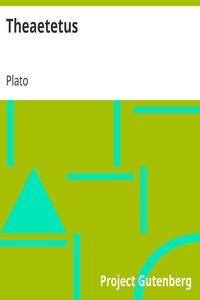| Author |
Plato, 428? BCE-348? BCE |
| Translator |
Jowett, Benjamin, 1817-1893 |
| Title |
Theaetetus
|
| Note |
Wikipedia page about this book: https://en.wikipedia.org/wiki/Theaetetus_(dialogue)
|
| Note |
Reading ease score: 62.8 (8th & 9th grade). Neither easy nor difficult to read.
|
| Note |
Socrates
|
| Credits |
Produced by Sue Asscher, and David Widger
|
| Summary |
"The Theaetetus" by Plato is a philosophical dialogue likely written in the late 4th century BC. The work explores the nature of knowledge through an exchange between Socrates, the protagonist, and a young mathematician named Theaetetus, as they dissect various definitions and theories regarding the essence of knowledge. At the start of the dialogue, we learn of Theaetetus's unfortunate condition, having been wounded and brought back from battle, which sets a reflective tone surrounding his potential. Socrates directly engages Theaetetus, leading him in a dialectical examination that begins with the definition of knowledge as "sensible perception," drawing on Protagorean thought. The conversation unfolds into deeper explorations involving perception, opinion, and falsehoods, revealing the complexities behind defining knowledge itself, while showcasing Socrates’s midwifery-like role in drawing out ideas from Theaetetus. This opening section sets the foundation for a rigorous philosophical inquiry that probes the limits of human understanding and cognition. (This is an automatically generated summary.)
|
| Language |
English |
| LoC Class |
PA: Language and Literatures: Classical Languages and Literature
|
| Subject |
Classical literature
|
| Subject |
Knowledge, Theory of -- Early works to 1800
|
| Category |
Text |
| EBook-No. |
1726 |
| Release Date |
Apr 1, 1999 |
| Most Recently Updated |
Jan 28, 2017 |
| Copyright Status |
Public domain in the USA. |
| Downloads |
1442 downloads in the last 30 days. |
|
Project Gutenberg eBooks are always free!
|

